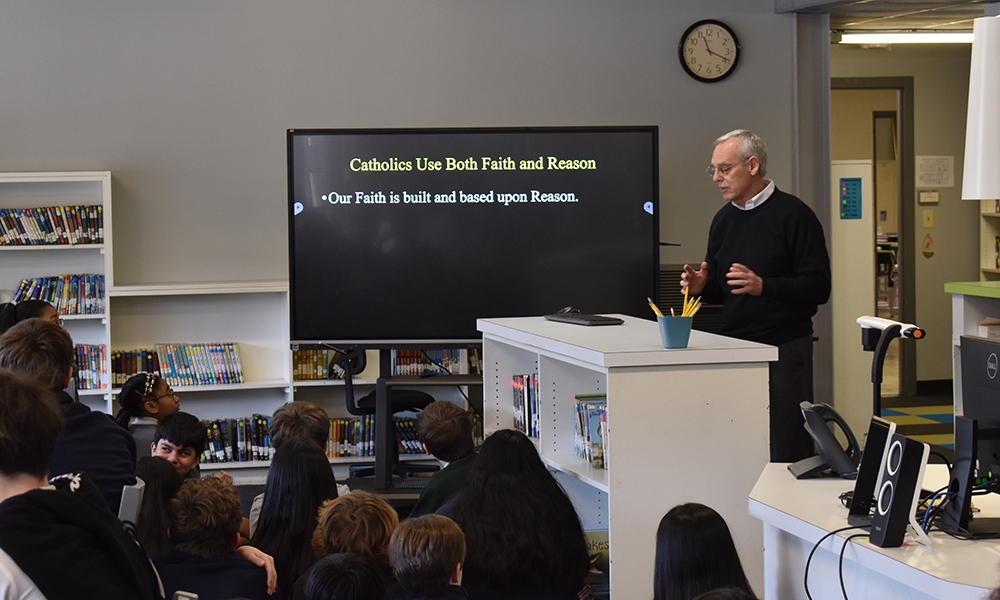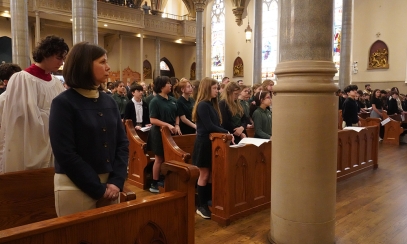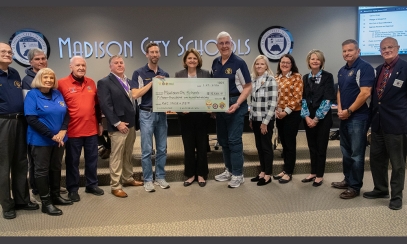
Deacon Neal Kay speaks to students about science and God
Deacon Neal Kay recently spoke to St. Francis Xavier Catholic School’s middle school students about the intersection between science and the Catholic faith.
Deacon Kay, a retired cardiovascular clinician and University of Alabama at Birmingham (UAB) professor, now serves as a permanent deacon at SFX Parish, of which SFX School is a mission.
Students in the sixth, seventh, and eighth grades gathered in the library on Feb. 20 to listen to the deacon speak.
Deacon Kay began by pointing to the “Five Ways” of St. Thomas Aquinas. The “Five Ways,” listed in Aquinas’s Summa Theologica, are five logical arguments for the existence of God.
“[Aquinas] was born in 1224,” Deacon Kay said. “[He] was one of the most brilliant minds that has ever lived, and he said that there are five ways we can know, just by thinking, that there has to be a God. Just by using our reason.”
One of Aquinas’s “Five Ways” is the argument from the “unmoved mover” and is similar to an argument the Ancient Greek philosopher Aristotle made over a thousand years before his time.
“Everything in the universe that moves is moved by something else,” Deacon Kay explained. “When you think about that, if you throw a baseball, how did the baseball get moving? Because you threw it. Everything in the universe that’s moving has to be moved by something else. If that which is moving is itself moved, then it, too, must be moved by something else.”
“In other words, if you throw a baseball, you’re the source of that motion, but where did you come from?” he continued. “Who moved you? So, we go back on that. We say this chain can’t be infinitely long, so there must be something at the very beginning that causes motion without itself moving. This is what St. Thomas Aquinas would say that everyone understands … to be God.”
Deacon Kay spent the rest of his talk discussing how modern science also points to God’s existence.
“Science can prove that there are intrinsic limits to our physical universe,” Deacon Kay said. “It can show that there is a limit to how old our universe is… Science can prove that the universe had to have a beginning. What science cannot explain is the cause of the universe. We understand the universe began, but we don’t understand why the universe began. Therefore, science cannot disprove a reality beyond what we can observe.”
According to Deacon Kay, many scientific advancements have come from the work of Catholic priests and clerics.
“The Catholic Church has always been a champion of science,” he explained. “There have been no less than 286 priests and clerics involved in the development of every branch of science.”
These Catholic scientists included Nicolaus Copernicus, who proved the sun (not the Earth) was the center of the solar system; Gregor Mendel, who is recognized as the founder of modern genetics; and Nicolas Steno, whose work on the formation of rock layers was critical in the development of today’s understanding of geology.
It also included Georges Lemaitre, a Catholic priest and professor of physics who developed the “Big Bang Theory,” the idea that the universe originated from an incredibly small, single point and continues to expand today.
Deacon Kay explained that astronomer Edwin Hubble later confirmed the idea of the expanding universe and that Lemaitre’s theory convinced renowned physicist Albert Einstein of some form of God.
Deacon Kay also discussed how mathematically improbable it is to live in a universe capable of supporting life.
“Everything in our universe is tuned to give us life,” he said. “It just doesn’t make sense that this is by chance.”
Deacon Kay concluded by reminding students of the compatibility between faith, science, and reason.
“Our faith is based on reason, and when we use our reason, we prove that there has to be a God,” he said. “Anybody who tells you that science doesn’t believe in God, they’re crazy.”
Because the school uses a classical Catholic curriculum, SFX scholars have the privilege of approaching the natural world with a sense of wonder inspired by and stemming from the framework passed down to us through the Catholic intellectual tradition.
Middle school students at SFX receive instruction in math and science every day in Daniel LaSusa’s class. They also apply logic and think critically about classic literature, world history, and religion in their other classes.
Some of the middle schoolers at SFX have tested into Jeannie Walker’s advanced math class, which places them on track to take advanced math at John Carroll Catholic High School (JCCHS) upon graduation.
To learn more about SFX School, please visit sfxcatholic.com or schedule a tour by calling 205-871-1687.



